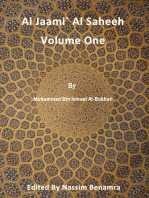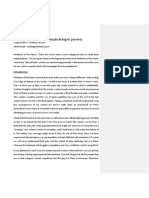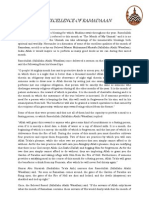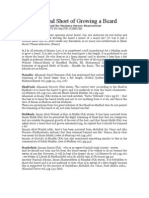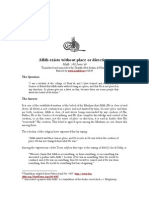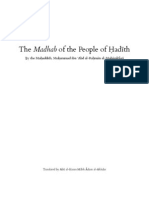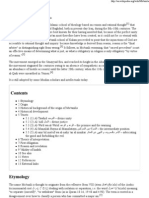Usage of Word Salaf
Usage of Word Salaf
Uploaded by
none0099Copyright:
Available Formats
Usage of Word Salaf
Usage of Word Salaf
Uploaded by
none0099Original Description:
Copyright
Available Formats
Share this document
Did you find this document useful?
Is this content inappropriate?
Copyright:
Available Formats
Usage of Word Salaf
Usage of Word Salaf
Uploaded by
none0099Copyright:
Available Formats
1. Prophet Muhammad ( d.
11H)
Aisha reported: We, the wives of Allaahs Prophet , were with him (during his last illness) and none was absent there from that Fatima, who walked after the style of Allaahs Messenger , came there, and when he saw her he welcomed her saying: You are welcome, my daughter. He then made her sit on his right side or on his left side. Then he said something secretly to her and she wept bitterly and when he found her (plunged) in grief he said to her something secretly for the second time and she laughed. I (Aisha) said to her: Allaahs Messenger has singled you amongst the women (of the family) for talking (to you something secretly) and you wept. When Allaahs Messenger recovered from illness, I said to her. What did Allaahs Messenger say to you? Thereupon she said: I am not going to disclose the secret of Allaahs Messenger ( .) When Allaahs Messenger died, I said to her: I adjure you by the right that I have upon you that you should narrate to me what Allaahs Messenger said to you. She said: Yes, now I can do that (so listen to it). When he talked to me secretly for the first time he informed me that Gabriel was in the habit of reciting the Quran along with him once or twice every year, but this year it had been twice and so he perceived his death quite near, so fear Allaah and be patient (and he told me) that he would be a befitting SALAF (forerunner) for me and so I wept as you saw me. And when he saw me in grief he talked to me secretly for the second time and said: Fatima, are you not pleased that you should be at the head of the believing women or the head of this Umma? I laughed and it was that laughter which you saw. [Sahih Muslim, The Virtues of the Companions (Book 31), CHAPTER: THE MERITS OF FATIMA, DAUGHTER OF ALLAAH'S APOSTLE (SALLALLAAHU ALAYHI WA SALLAM), No. 6004] Narrated Aisha: He added, But this year he (referring to Gabriel due to hadith in Sahih Muslim above) reviewed it with me twice, and therefore I think that my time of death has approached. So, be afraid of Allah, and be patient, for I am the best SALAF (predecessor) for you (in the Hereafter). Fatima added, So I wept as you (Aisha) witnessed. And when the Prophet saw me in this sorrowful state, he confided the second secret to me saying, O Fatima! Will you not be pleased that you will be chief of all the believing women (or chief of the women of this nation i.e. my followers?) [Sahih Bukhari, Volume 8, The Book of Asking Permission, No. 5885]
2. Ayyub Al-Sakhtiyani (130H)
Whoever loves Abu Bakr has upheld the religion, whoever loves Umar has made the way clear, whoever loves Uthman is enlightened by the light of Allah, and whoever loves Ali has taken the firmest handhold. Whoever speaks well of the Companions of Allahs Messenger Allahs peace and blessings be upon him is clear of hypocrisy (nifaq), but whoever belittles any one of them or dislikes [any one of them] for something he did, then he is a heretic (mubtadi), an opponent of the Sunnah and the SALAF (Righteous Predecessors), and it is feared that none of his deeds will be raised to the heavens until he loves all of [the Companions] and his heart is clear towards them. [Ibn Abi Zamanin, Usul Al-Sunnah article 189]
3. Abu Haneefah (d.151H)
Stick to the athaar (narrations) and the way of the SALAF and beware of newly invented matters, for all of it is innovation. [Related by as-Suyootee in Sawnul-Mantaq wal-Kalaam (p.32)]
4. Abdur-Rahmaan al-Awzaaee (d. 157H)
Hold fast to the narrations of the SALAF, even if people were to abandon you. Beware of the opinions of the people, no matter how much they beautify it with their speech. [Related by al-Khateeb al-Baghdadee in his excellent book Sharafu Ashaabul-Hadeeth (p.7)] al-Awzaaee also said: Fortify your soul with having patience upon the Sunnah. And stop at where the people (i.e. the Salaf) have stopped. And derive your statements from where they drew their statements (i.e. the Quraan and Sunnah). And be satisfied with what they were satisfied with. And tread the path of your SALAF AS-SAALIH (PIOUS PREDECESSORS), for indeed you will be sufficed by what sufficed them. [Reported by Ismaa'eel Ibn al-Fadl in Al-Hujjah fee Bayaan-il-Mahajjah with an authentic chain of narration]
5. Ahmad ibn Hanbal (d.241H)
Ninety men from the Taabieen, the scholars of the Muslims and of the SALAF and the Jurists of the various cities are [unanimously] agreed that the Sunnah upon which the Messenger of Allaah ( ) died is: [then he listed 14 points] [Tabaqaatul-Hanaabiliah, 1/130-131]
6. Abu Jafar at-Tahawi (d. 321)
And the early scholars from the SALAF (the early predecessors), and the Taabieen (successors) who came after them: the people upon good and the narrations, and the people of Fiqh and discernment; are not to be mentioned except with fine words; and whoever speaks ill of them then he is not upon the correct path. [Aqeedah Tahawiyyah, point 203]
7. Abu Muhammad Ibn Abi Zayd al-Qayrawani (d.386)
He said while discussing the affairs of the Religion that the Muslim nation has unanimously agreed upon and the aspects of the Sunnah that if opposed is considered innovation (bidah) and misguidance, [This requires] total submittance to the Sunnah. It is not to be opposed by opinion or averted by way of analogy. The way the texts were interpreted by the righteous SALAF, then we interpret them in the same fashion; and whatever way they applied them, then we apply them in the same way and whatever they abandoned then we abandon. We refrain from what they refrained from and we follow them in what they have explained. [al-Jami (p.117) of Ibn Abi Zayd al-Qayrawani]
8. al-Laalikaaee (d. 418H)
That which is most obligatory upon a Muslim: Knowledge of the aspects of the creed of the Religion and what Allaah has obligated upon His Servants including the understanding of His Tauheed and of His Attributes, and believing in His Messengers with evidences and with certainty. And arriving at [all of] that and seeking evidences for them with clear proofs. And among the mightiest of statements and clearest of proofs and understandings is: [1] The Book of Allaah, the Manifest Truth [2] Then the Saying of the Messenger of Allaah (sallallaahu alaihi wasallam) [3] And of his Companions, the chosen, pious ones [4] Then that which the SALAF US-SAALIH were unanimously agreed upon [5] Then holding fast to all of that and remaining firm upon it till the Day of Judgement [6] Then turning away from the innovations and from listening to them from amongst those things the astray people have invented [Sharh Usool ul-I'tiqaad (1/9)]
9. Aboo Uthmaan as-Saboonee (449H)
The scholars of the Ummah and in particular the aaimmah from the SALAF, raheemahumullaah, did not disagree that Allaah, The Most High, is over His Throne and the Throne is above the seven heavens. They affirm what Allah, the Most High,
has affirmed, and believe in what He, The Lord, the Most Majestic, has informed us with. ['Aqeedatus-Salaf as'haabul-Hadeeth - The Creed of the (Pious) Predecessors & the People of Hadeeth, Chapter 5 : Allaah Istiwaa over his throne, point 22]
10. Al-Khateeb al-Baghdaadee (d.463H)
He said in his treatise al-Kalaam fis-Sifaat, As for speech concerning the Attributes, then whatever is related about them from the authentic Sunan in the madhhab of the SALAF may Allaah be pleased with them all is to be affirmed and conveyed upon its apparent (dhaahir) meaning, and the kayfiyyah (modality) and tashbeeh (resemblance) must be negated from it. [Recorded by Ibn Qudaamah in Dhammut-Ta'weel (p. 17-18)]
11. Al-Asbahaanee (d.535H)
The sign of Ahlus-Sunnah is that they follow the SALAFUS-SAALIH and abandon all that is innovated and newly introduced into the Deen. [Al-Hujjah fee Bayaanil Mahajjah 1/364]
12. As-Samaanee (d.562H)
We have been commanded to follow and we have been encouraged with this. We have been forbidden from innovating (bidah) and severely warned against such behaviour. The hallmark of the People of the Sunnah is their adherence to AL-SALAF AL-SALIH (the Pious Predecessors) and their abandonment of everything that constitutes an innovation (mubtada) or a matter from the Religion that appears without precedent (muhdath) [al-Intisar li Ahl al-Hadith of Abu al-Muzaffar al-Sam'ani by way of the book Sawn alMantaq wa al-Kalam (p.158)] As-Samaanee also said in al-lnsaab (3/273): AS-SALAFI: this is an ascription to the SALAF and following their ways, in that which is related from them. lbn al-Atheer (d.630H) said in al-Lubaab fee Tahdheebul-lnsaab (2/162), commenting upon the previous saying of as-Samaanee: And a group were known by this ascription.
13. Ibn Qudaamah al-Maqdisee (d.620H)
Abu Dawood reported in his Sunan that the Prophet said: Indeed what is between one level of heaven and (another) level of heaven is a
distance of such and such He continued until he mentioned: And above that is the Throne. And Allaah, the One free of all defects, is above that. This and what is similar to it is from what the SALAF, may Allaah have mercy of them, have unanimously agreed upon reporting and accepting. And we do not incline towards rejecting it, or toward distorting its meaning (taweel), or towards making comparisons to it, nor towards likening it. [Lumut-ul-Itiqaad (Sufficiency in Creed) of Ibn Qudaamah al-Maqdisee, Chapter/Section: Mentioning Some of the Ahaadeeth of Allaah's Attributes, points 18 19]
14. lbn Taymiyyah (d.728H)
There is no criticism for the one who proclaims the way (madhhab) of the SALAF, who attaches himself to it and refers to it. Rather, it is obligatory to accept that from him by unanimous agreement (Ittifaaq) because the way (madhhab) of the SALAF is nothing but the Truth (Haqq). [Majmoo al-Fataawaa 4:149]
15. Adh-Dhahabee (d.748H)
It is authentically related from ad-Daaraqutnee that he said: There is nothing more despised by me than ilmul-kalaam (innovated speech and theological rhetoric). I say: No person should ever enter into ilmul-kalaam, nor argumentation. Rather, he should be SALAFEE (a follower of the Salaf). [Siyar 16/457] Adh-Dhahabee also said concerning the biography of Muhammad Ibn Muhammad alBahraanee, He was a good SALAFEE with respect to the Religion. [Mu'jamush-Shuyookh (2/280)] He also said about Imaam Abul-Abbaas bin Majd al-Maqdisi, He was reliable and trustworthy, intelligent, SALAFI and pious [Siyar 23/118]
16. Ibn al-Qayyim (d.751H)
Our Shaykh said, The reality of disbelief has been married to immoral innovation (bidah) and they have given birth to a state of loss in the life of this world and the hereafter. If he overcomes this imposing obstacle and escapes it with the light of the Sunnah, and he seeks to stay clear of it by truly adhering to the Sunnah and by emulating those who have passed from the illustrious SALAF from the Companions
and their students who followed them in goodness, and it is rare for these later generations to produce one of these types of people [Madarij al-Salikin (1/223)]
17. Ibn Kathir (d.774H)
His tafsir of: and then He [Surah Al-A'raf (7):54] rose over (Istawa) the Throne
the people had several conflicting opinions over its meaning. However, we follow the way that our SALAF (righteous predecessors) took in this regard, such as Malik, AlAwzai, Ath-Thawri, Al-Layth bin Sad, Ash-Shafii, Ahmad, Ishaq bin Rahwayh and the rest of the scholars of Islam, in past and present times. Surely, we accept the apparent meaning of, Al-Istawa, without discussing its true essence, equating it (with the attributes of the creation), or altering or denying it (in any way or form). And his tafsir of: The Most [Surah Ta-Ha (20):5] Gracious Istawa the Throne
discussion concerning this has already preceded in Surat Al-Araf, so there is no need to repeat it here. The safest path to take in understanding this, is the way of the SALAF (predecessors). Their way was to accept that which has been reported concerning this from the Book and the Sunnah without describing it, reinterpreting it, resembling it to creation, rejecting it, or comparing it to attributes of the creatures. [Tafsir Ibn Kathir, Section:The Qur'an is a Reminder and a Revelation from Allah]
18. Ash-Shatibi (d.790H)
The SALAFUS-SALIH, the Companions, the tabieen and their successors knew the Quraan, its sciences and its meanings the best. [al-Muwafiqat (2/79) of ash-Shatibi]
19. Ibn Abi al-Izz al-Hanafi (d. 792H)
And whoever hears the hadiths of the Messenger salla Allahu alayhi wa sallam- and the words of the SALAF, will find innumerable evidences of Allahs Elevation, and there is no doubt that when Allah created the creation, He did not create them in His divine Essence, Exalted is Allah from this! [Sharh al-'Aqeedah al-Tahawiyah by Ibn Abil-`Izz al-Hanafi (1/372,379-380)]
20. Al-Hafidh Ibn Hajar al-Asqalani (d. 852H)
..the saying of who said: the way of the SALAF is safer and the way of the Khalaf is wiser is not correct, because he thought that the way of the SALAF is only the belief in the Lafz (words/letters) of the Quran and Hadith without having understanding of it , (and) the way of the Khalaf is to derive the meanings of the texts that are turned away from their haqiqa with different types of majaz (figurative meaning); so the one who said this combined between the ignorance of the way of the SALAF and the claiming of the way of the Khalaf, and it is not like he thought/assumed. The SALAF had utmost knowledge of what befits Allah, and had the utmost glorification, obedience to His commands and submission to what He intended/willed, and the one who took the path of the Khalaf is not sure that his tawil is what is intended, and he cant be positive of the correctness of his tawil. [Fath al Bari sharh Sahih al Bukhari, Book of Tawhid, 1st chapter, 2nd hadith in its explanation] Stated al-Haafidh Ibn Hajr about Abu Amr Ibn as-Salaah, He was extremely strong and given to devotion, SALAFI in the generality (of his affairs) [Siyaar 23/142]
21. As-Suyooti (d. 911H)
Stated as-Suyooti about Ibn as-Salaah, He was SALAFI, abstemious and was of sound creed [Tabaqaat al-Huffaadh p.500]
22. As-Safaareenee (d.1188H)
What is meant by the madh-hab (belief) of the SALAF is that which the Companions, may Allaah be pleased with them, adhered to, as well as the distinguished ones who followed them upon goodness, their successors and the Imaams of the Religion those who received testimony as to their leadership, were known for their great status in the Religion and whose words are taken by the people after the SALAF, apart from those who are accused of innovation or renowned for unacceptable ascriptions such as the Khawaarij, Rawaafid, Qadariyyah, Murjiah, Jabariyyah, Jahmiyyah, Muatazilah, Karaamiyyah and those similar to them. [Lawaami'-ul-Anwaar: (1/20)]
23. Muhammad Ibn Abdul-Wahhaab (d.1206H)
After mentioning the hadith ending in Ukashah has preceded you which is recorded in the two Sahihs (Bukhari and Muslim), the following important points/benefits derived from this hadith were noted:
* That the SALAF used to keep away from riyaa and anything that might lead to it * The profound knowledge of the SALAF [Kitab at-Tauheed, Chapter: The one who fulfils tawhid enters paradise without reckoning]
24. Abdur Rahmaan as-Sadee (d.1376H)
Know that from the agreed upon principles by the SALAF and the Imaams of this Ummah (Muslim nation) is belief in His Names and Attributes and the verdicts concerning those Attributes. [His Tafsir of the Qur'aan: Tayseer al-Kareem ar-Rahmaan fee Tafseer Kalaam alMannaan, Tafsir of Surah Al-Fatihah]
25. Muhammad Naasir-Uddin al-Albaanee (d.1420H)
as for the one who ascribes himself to the SALAF AS-SALIH collectively then he ascribes himself to that which is protected from mistakes [Al-Asaalah Magazine (no.9/p87)]
Q & A related to the Salaf
Posted: December 17, 20 10 in Tags: ahl ul-hadith, ahlus sunnah wal-jamaah, firqatun najiyah, salaf, salafi, saved sect, sunni
S alaf
2 Votes SOURCE : http://calgaryislam.com/ The following questions are answered and addressed:
What or who is Salaf? What is Salafiyyah? Who is a Salafi? Is it another party/group? What is the call of Dawatus-Salafiyyah? Allaah Has Named us Muslims, So Why Ascribe Ourselves to the Salaf? So Who Are Ahl ul-Hadith?
WHAT OR WHO IS A SALAF?
The word Salaf is a shortened version of the word Salafus-Saalih, which means the Righteous Predecessors. It refers specifically to the first three generations of Islaam. The first, the Prophet sallallaahu alaihi wa sallam & his Sahaabah (companions). The second, the Taabieen (the followers of the companions). The third, the TabaaatTaabieen (the followers of the followers of the companions). Generally, this term refers to all those pious predecessors who followed the way of the Salaf and who have preceded us in time.
WHAT IS SALAFIYYAH?
It is the way of following the Salaf, in creed/belief, speech and actions, regardless of time or location. It is to understand and implement the religion as was understood and implemented by the Salaf. Following it exactly to the best of ones ability, and to beware and refrain from that which opposes it.
WHO IS A SALAFI?
The person who ascribes and adheres to the way of the Salaf. Just like the one born in a certain country is called the countryman of that country, due to his ascription to it. In other words the person who says I am one who ascribes myself to the way of
Salafus-Saalih, who are the Prophet sallallaahu alaihi wa sallam & his Sahaabah, the Taabieen, and the Tabaaat-Taabieen in creed, speech and actions. It should be noted that a mere claim is not sufficient to establish the proof that one adheres to it.
IS IT ANOTHER PARTY/GROUP?
No it is NOT a party from among the parties, regardless of what people may claim. It is only an ascription to the Salafus-Saalih and their methodology, and calling to this noble methodology. It has NO Imaam, except for Abul-Qaasim Muhammad ibn Abdillaah sallallaahu alaihi wa sallam. Shaikh Salih al-Fawzaan was asked, Is Salafiyyah a hizb (party) from amongst the parties. And is ascribing to them (i.e. the Salafis) a blameworthy thing? To which he replied, As-Salafiyyah (i.e. the Salafis) is the Saved Sect, and they are Ahl us-Sunnah wal-Jamaaah. It is not a hizb (party) from amongst the various parties, those which are called parties today. Rather they are the Jamaaah, the Jamaaah upon the Sunnah and upon the Deen (religion). They are Ahl us-Sunnah walJamaaah. The Messenger (sallallaahu alaihi wasallam) said, There will not cease to be a group from my Ummah manifest and upon the truth not being harmed by those who forsake them neither by those who oppose them and he (sallallaahu alaihi wasallam) also said, And this Ummah will split into seventy-three sects, all of them in the Hellfire but one. They said, which one is this O Messenger of Allaah? He replied, They are those who are upon what I and my companions are upon today. Hence Salafiyyah is a group of people (i.e. the Salafi s) upon the madhhab of the Salaf, upon what the Messenger (sallallaahu alaihi wasallam) and his companions were upon and it is not a hizb from amongst the contemporary groups present today. Rather it is the very old Jamaaah, from the time of the Messenger (sallallaahu alaihi wasallam) which inherits (this way) and continues, and which never ceases to be upon the manifest truth until the establishment of the Hour, as he (sallallaahu alaihi wasallam) has informed (us). (Cassette: at-Tahdheer min al-Bidah second cassette, delivered as a lecture in Hawtah Sadeer, 1416H).
WHAT IS THE CALL OF DAWATUS-SALAFIYYAH?
It is the pure religion which calls to Tauheed (singling out Allaah) and sincerity of worship. The call of all the prophets and messengers. Allaamah Ubayd al-Jaabiree.
ALLAH HAS NAMED US MUSLIMS, SO WHY ASCRIBE OURSELVES TO THE SALAF?
This doubt was very beatifully answered by Imaam al-Albaani in his discussion with someone on this subject, recorded on the cassette entitled, I am Salafi, and here is a presentation of the vital parts of it:
Shaikh al-Albaani: When it is said to you, What is your madhhab, what is your reply? Questioner: A Muslim. Shaikh al-Albaani: This is not sufficient!. Questioner: Allaah has named us Muslims and he recited the saying of Allaah Most High, He is the one who has called you Muslims beforehand. (al-Hajj 22:78) Shaikh al-Albaani: This would be a correct answer if we were in the very first times (of Islaam) before the sects had appeared and spread. But if we were to ask, now, any Muslim from any of these sects with which we differ on account of aqeedah, his answer would not be any different to this word. All of them the Shiite Rafidi, the Khaariji, the Nusayri Alawi would say, I am a Muslim. Hence, this is not sufficient in these days. Questioner: In that case I say, I am a Muslim upon the Book and the Sunnah. Shaikh al-Albaani: This is not sufficient either. Questioner: Why? Shaikh al-Albaani: Do you find any of those whom we have just mentioned by way of example saying, I am a Muslim who is not upon the Book and the Sunnah? Who is the one who says, I am not upon the Book and the Sunnah?At this point the Shaikh then began to explain in detail the importance of being upon the Book and the Sunnah in light of the understanding of the Salaf us-Saalih Questioner: In that case I am a Muslim upon the Book and the Sunnah with the understanding of the Salaf us-Saalih. Shaikh al-Albaani: When a person asks you about your madhhab, is this what you will say to him? Questioner: Yes. Shaikh al-Albaani: What is your view that we shorten this phrase in the language, since the best words are those that are few but indicated the desired intent, so we say, Salafi? End of quotation. Hence, the point is that naming with Muslim or Sunni is not enough, since everyone will claim that. And Imaam al-Albaani emphasised the importance of the truth being distinguished from the falsehood from the point of view of the basis of manhaj and aqidah, and that is taking from the Salaf us-Saalih, as opposed to the
various sects and groups whose understandings are based upon those of their mentors and leaders and not that of the Salaf, fundamentally.
SO WHO ARE AHL UL-HADITH?
Author: Shaikh Rabee bin Haadee al-MadkhaleeSource: Makaanat Ahl ul-Hadith (trans. by Bilal Davies, forthcoming SP release) They are those who proceed upon the way of the Companions and those who followed them in righteousness, in clinging to the Book and the Sunnah, biting onto that with their molar teeth, and letting them (i.e., the Quraan and the Sunnah) take precedence over any statement or code and conduct whether in belief, or acts of worship such as dealings and transactions, mannerisms, politics or social life. They are those who are firm in regards to the fundamentals of the religion and its subsections, upon that which Allaah sent down and revealed upon his servant and Messenger Muhammad (sallallaahu alaihi wasallam). They are those establishing the call to that with all effort, sincerity and firm will. They are those carrying the knowledge of the Prophet (sallallaahu alaihi wasallam), expelling from it the distortions of those who have exaggerated (in its regard) and the undue claims of the people of falsehood and the interpretations of theignorant ones. They are those who are observant and lie in wait for every group that has deviated from the way of Islaam, like the Jahmees and the Mutazilees and the Khawaarij and the Rawaafidh and the Murjiah and the Qadriyyah and all of those who have deviated from the way of Allaah and have followed their desires in every time and place they not affected by the reproach of the blamers, in the cause of AllaahThey are the group that the Messenger of Allaah has praised and commended in his saying, There will not cease to be a group from my Ummah manifest and upon the truth not being harmed by those who forsake them neither by those who oppose them until the hour is established. [1] They are the Saved Sect firm upon that which the Messenger and his Companions were upon, those who have been distinguished and defined by the Messenger of Allaah when he mentioned that this Ummah shall divide into seventy three sects all going to the Hell-fire except one and it was said, Who are they, O Messenger of Allaah? He said, They are those who are upon that which I and my Comapnions are upon.And this is not something we say in exageration or a mere claim, but verily we speak a reality that the text of the Quraan and the Sunnah bears witness to, which history bears witness to, and to which their (i.e., the Ahlul-Hadeeths) statements, their state of affairs, their writings and works also bear witness to. They are those who put before their eyes the statement of Allaah:And hold fast, all of you together, to the rope of Allaah. [2]And His statement:And let those who oppose the Messengers commandment beware lest some fitnah befall them or a painful torment be inflicted on them. [3]
They are the most staunch in distancing themselves from opposing the command of the Messenger and the most distant from fitnah. They are those who make their constitution:But no, by your Lord! They can have no faith, until they make you (O Muhammad (sallallaahu alaihi wasallam)) judge in all disputes between them, and find in themselves no resistance against your decisions, and accept them with full submission. [4] They are those who give to the Quraan and the Sunnah their true worth and give it the honour and veneration it deserves, giving priority to them over all the statements of mankind, and give precedence to their guidance over the guidance of all the people, and they judge by them in all affairs with complete pleasure, with chests which are expanded and free of restraint or constriction, and they submit to Allaah and His Messenger (with) a complete submission in their aqeedah and their worship and their dealings. They are those concerning whom the statement of Allaah holds true:The only saying of the faithful believers when they are called to Allaah and His Messenger (sallallaahu alaihi wasallam) to judge between them, is that they say, We hear and we obey, and such are the prosperous ones.[5] They after all of the Comapanions and at the head of them the rightly guided Caliphs are the leaders of the taabieen and at the head of them: Saeed ibn alMusayyib (d. 90H), Urwah ibn Zubair (d. 94H), Alee ibn al-Hussain Zain alAabideen (d. 93H), Muhammad ibn Hanafiya (d. 80H), Ubaydullaah ibn Abdillaah ibn Utbah ibn Masood (d. 94H or later), Saleem ibn Abdillaah ibn Umar (d. 106H), Qaasim ibn Muhammad ibn Abee Bakr as-Sadeeq (d. 106H), al-Hasan al-Basree (d. 110H), Muhammad ibn Sireen (d. 110H), Umar ibn Abdul-Azeez (d. 101H) and Muhammad ibn Shihaab az-Zuhree (d. 125H). Then the Atbaaat-Taabieen and at the head of them: Imaam Maalik (d. 179H), alAwzaaee (d. 157H), Sufiyaan ibn Saeed ath-Thawree (d. 161H), Sufyaan ibn Uyayna (d.198H), Ismaaeel ibn Ubya (d. 193H), Layth ibn Sad (d. 175H) and Aboo Haneefah an-Numaan (d. 150H). Then those who followed them and at the head of them: Abdullaah ibn al-Mubaarak (d. 181H), Wakee ibn al-Jarraah (d. 197H), the Imaam Muhammad ibn Idrees ashShaafiee (d. 204H), Abdur-Rahmaan ibn Mahdee (d. 198H), Yahya ibn Saeed alQataan (d.198H) and Afaan ibn Muslim (d. 219H). Then their students who followed them in this methodology, and at the head of them: the Imaam Ahmad ibn Hanbal (d. 241H), Yahya ibn Maeen (d. 233H) and Alee ibn al-Madeenee (d. 234H). Then their students like al-Bukhaaree (d. 256H), Muslim (d. 261H), Abee Haatim (d. 277H), Abee Zara (Aboo Zurah?) (d. 264H), Aboo Daawood (d. 275H), atTirmidhee (d. 279H) and an-Nasaaee (d. 303H).
Then those who proceeded in their way in the generations that preceded them, like Ibn Jareer (at-Tabaree?) (d. 310H), Ibn Khuzaymah (d. 311H), ad-Daaraqutnee (d. 385H) in his time, al-Khateeb al-Baghdaadee (d. 463H) and Ibn Abdul-Barr anNiwaaree (d. 463H). And Abdul-Ghanee al-Maqdasee (d. 620H), Ibn Salaah (d. 643H), Ibn Taymiyyah (d. 728H), al-Mizzee (d. 743H), adh-Dhahabee (d. 748H), Ibn Katheer (d. 774H) and their contemporaries who lived in their time and those who came after them, and followed their footsteps in holding on to the Book and the Sunnah up until the present day. These are who I mean by Ahlul-Hadeeth.
NOTES [1] Hadeeth saheeh, collected by Muslim (3/1523), Ahmad (5/278-279), Aboo Dawood (3/4), Tirmidhee (4/420), Ibn Maajah (1/4-5), Haakim (4/449-450), atTabaraanee in Mujam al-Kabeer (7643) and Aboo Daawood at-Tayaalisi (p. 94, no. 689). Authenticated by al-Albaanee in As-Saheehah (270-1955).
You might also like
- Be A Serious Salafi by Shaykh Abdus Salam As-SihaymiDocument117 pagesBe A Serious Salafi by Shaykh Abdus Salam As-SihaymiRazkhal KunmoNo ratings yet
- Until The Sun Rises From The West EssayDocument11 pagesUntil The Sun Rises From The West EssayIqra Bismi Rabbi Kallazee KhalaqNo ratings yet
- A Daily Routine For The Seeker of Knowledge Sh. Muhammad Al UthayminDocument62 pagesA Daily Routine For The Seeker of Knowledge Sh. Muhammad Al UthayminshireenaaNo ratings yet
- The Obligation of The Hijaab (Women Covering) Shaykh Dr. Saleh Al FawzaanDocument6 pagesThe Obligation of The Hijaab (Women Covering) Shaykh Dr. Saleh Al FawzaanMountainofknowledgeNo ratings yet
- The Path of Truth - "Manhaj-Al-haqq" - منظومة منهج الحق للسعدي by Shaikh as-Sa‘deeDocument8 pagesThe Path of Truth - "Manhaj-Al-haqq" - منظومة منهج الحق للسعدي by Shaikh as-Sa‘deeMountainofknowledge100% (2)
- The Difference Between a Prophet and a MessengerFrom EverandThe Difference Between a Prophet and a MessengerNo ratings yet
- Pariksha Manthan Computer Ek Parichay BookDocument201 pagesPariksha Manthan Computer Ek Parichay Booknone0099100% (3)
- THE BIBLE: WORD OF GOD OR WORD OF MAN? by A.S.K. JoommalDocument103 pagesTHE BIBLE: WORD OF GOD OR WORD OF MAN? by A.S.K. JoommalЖаяам Дмэя89% (9)
- Complete Islamyat BookDocument110 pagesComplete Islamyat BookNoor Ahmed100% (1)
- Partitions of The Heart - Summury and PerspectiveDocument6 pagesPartitions of The Heart - Summury and PerspectiveMeryam ZianiNo ratings yet
- Thayer Insurgency in Southern ThailandDocument24 pagesThayer Insurgency in Southern ThailandCarlyle Alan Thayer100% (3)
- The Excellence of The Companions - May Allah Be Pleased With Them All - Taken From The Chapters of 'Aqeedah From The Book 'Siyaar 'Alaam An-Nubala'Document14 pagesThe Excellence of The Companions - May Allah Be Pleased With Them All - Taken From The Chapters of 'Aqeedah From The Book 'Siyaar 'Alaam An-Nubala'Mountainofknowledge100% (2)
- Beware of SufismDocument25 pagesBeware of Sufismsameersemna0% (1)
- Principles Every Salafi Should Know - Shaykh Ahmad BāzmoolDocument7 pagesPrinciples Every Salafi Should Know - Shaykh Ahmad Bāzmoolhttp://AbdurRahman.org50% (2)
- Basic Islamic ManualDocument59 pagesBasic Islamic ManualJasmin Ebu IrfanNo ratings yet
- 10 Nullifiers of Islaam by Shaykh Ibn BaazDocument3 pages10 Nullifiers of Islaam by Shaykh Ibn BaazyunusaqNo ratings yet
- What Is Salafiyyah? PDFDocument2 pagesWhat Is Salafiyyah? PDFNasrin Akther100% (1)
- Allahs Existentiality and The Ashari Creed Explaining The Concept of 22bi Dhaatih22 For AllahDocument15 pagesAllahs Existentiality and The Ashari Creed Explaining The Concept of 22bi Dhaatih22 For AllahAdi NugrahaNo ratings yet
- A Summary of The Rulings For The Day of Eid: Abdullah Ibn Muhsin As-SāhoodDocument8 pagesA Summary of The Rulings For The Day of Eid: Abdullah Ibn Muhsin As-SāhoodArman BariNo ratings yet
- Salafi Man HajDocument49 pagesSalafi Man HajAbdullah SalafiNo ratings yet
- Answering The GhulaatDocument101 pagesAnswering The GhulaatAbuAbdurRahmanEesaMarqusNo ratings yet
- Be Careful Who You Take Your Deen From PDFDocument19 pagesBe Careful Who You Take Your Deen From PDFArman AghwaniNo ratings yet
- A Glimpse of The Deviated SectsDocument0 pagesA Glimpse of The Deviated SectsJamal DookhyNo ratings yet
- Basic Principles in Tawheed, Fiqh and AqeedahDocument39 pagesBasic Principles in Tawheed, Fiqh and AqeedahAdnan Sami100% (1)
- Kitab Al-Nasikh Wal-MansookhDocument26 pagesKitab Al-Nasikh Wal-MansookhIbn RushdhyNo ratings yet
- The Sunni Path (English)Document112 pagesThe Sunni Path (English)Dar Haqq (Ahl'al-Sunnah Wa'l-Jama'ah)No ratings yet
- Where Patience Is Mentioned in The Quraan - Tools For The Patient & Provisions For The Thankful - by Imam Ibnul QayyimDocument8 pagesWhere Patience Is Mentioned in The Quraan - Tools For The Patient & Provisions For The Thankful - by Imam Ibnul QayyimMountainofknowledgeNo ratings yet
- How To Obtain Ikhlaas (Sincerity) - Ibn Al-QayyimDocument2 pagesHow To Obtain Ikhlaas (Sincerity) - Ibn Al-QayyimUponSunnah100% (3)
- Twenty Reasons To Become A Scholar of IslamDocument6 pagesTwenty Reasons To Become A Scholar of IslamtakwaniaNo ratings yet
- The Correct Understanding Regarding Ruling by Other Than Allahs Law, According To The Scholars of Ahlus Sunnah Wal Jamaah Past & PresentDocument45 pagesThe Correct Understanding Regarding Ruling by Other Than Allahs Law, According To The Scholars of Ahlus Sunnah Wal Jamaah Past & PresentAbdul Kareem Ibn OzzieNo ratings yet
- The Excellence of RamadaanDocument4 pagesThe Excellence of Ramadaanraza-e-khushtarNo ratings yet
- Minimum Length of Beard For MuslimDocument4 pagesMinimum Length of Beard For MuslimMostafa Kamal100% (2)
- The View of Ahlus Sunnah & The Murji'ah Regarding Iman (Faith) Increasing & DecreasingDocument4 pagesThe View of Ahlus Sunnah & The Murji'ah Regarding Iman (Faith) Increasing & DecreasingAbdul Kareem Ibn OzzieNo ratings yet
- Democracy - The Modern Idol - Abu Yahya Al-Libi - Ahlut-Tawhid Publications PDFDocument31 pagesDemocracy - The Modern Idol - Abu Yahya Al-Libi - Ahlut-Tawhid Publications PDFAuthenticTauheed PublicationsNo ratings yet
- The Aqeedah of The SalafDocument10 pagesThe Aqeedah of The SalafFaheem LeaNo ratings yet
- Tazkiyyah of Al-Muhaddith Ubaydullah Al-Mubarakfuri For Al-Allamah Rabi Ibn Hadi Al-MadkhaliDocument2 pagesTazkiyyah of Al-Muhaddith Ubaydullah Al-Mubarakfuri For Al-Allamah Rabi Ibn Hadi Al-Madkhalihttp://AbdurRahman.orgNo ratings yet
- Preparing For The Day of Judgement by Imam Ibn Hajar Al-Asqalani PDFDocument48 pagesPreparing For The Day of Judgement by Imam Ibn Hajar Al-Asqalani PDFislamimedya100% (1)
- Furu Ul Iman The Branches of Iman by Maulana Ashraf Ali ThanwiDocument61 pagesFuru Ul Iman The Branches of Iman by Maulana Ashraf Ali Thanwipokkiri_jjNo ratings yet
- The Women Scholars of MadinahDocument13 pagesThe Women Scholars of MadinahShadab ShaikhNo ratings yet
- When Allah Loves His Worshipper He Test ThemDocument6 pagesWhen Allah Loves His Worshipper He Test Themabu abdullahNo ratings yet
- Question and Answer Session With Sheikh 'Ubaid Al Jabiree - Mustafa George DeBerryDocument9 pagesQuestion and Answer Session With Sheikh 'Ubaid Al Jabiree - Mustafa George DeBerryhttp://AbdurRahman.orgNo ratings yet
- Advice For Potential Students of KnowledgeDocument10 pagesAdvice For Potential Students of Knowledgejmosutton917No ratings yet
- Fiqh of Worship Sheikh Muhammad Salih Ibn Al UthaymeenDocument259 pagesFiqh of Worship Sheikh Muhammad Salih Ibn Al UthaymeenHassan MahmoodNo ratings yet
- Imam Ahmad Ibn Hanbal - The Champion of Islamic BeliefDocument3 pagesImam Ahmad Ibn Hanbal - The Champion of Islamic BeliefDhantel Rhesa PrawedhaNo ratings yet
- A Critical Analysis of Shirk QADHIDocument25 pagesA Critical Analysis of Shirk QADHIadnanfaisal78900% (1)
- Visiting-Graves of Auliya AllahDocument16 pagesVisiting-Graves of Auliya AllahsaudimanNo ratings yet
- Ilm e Rjal 1Document8 pagesIlm e Rjal 1Naalain e SyedaNo ratings yet
- Allah Exists Without A PlaceDocument3 pagesAllah Exists Without A PlaceSalafiaqidahNo ratings yet
- The Five Senses by Imam Ibn Qayyim Al-Jawziyah (751H) - The Abu Aaliyah GazetteDocument9 pagesThe Five Senses by Imam Ibn Qayyim Al-Jawziyah (751H) - The Abu Aaliyah GazetteshirazmohamedaliNo ratings yet
- Mutazilah Opinion On HadithDocument27 pagesMutazilah Opinion On HadithTsanarNo ratings yet
- A Letter On Ruling by Man Made Laws - Ahlut-Tawhid PublicationsDocument38 pagesA Letter On Ruling by Man Made Laws - Ahlut-Tawhid PublicationsAuthenticTauheed PublicationsNo ratings yet
- Common Rulings Related To ZakahDocument5 pagesCommon Rulings Related To ZakahmusarhadNo ratings yet
- Shaykh Ibn Uthaymeen Tafseer Ayat Al-Kursee With Other BenefitsDocument158 pagesShaykh Ibn Uthaymeen Tafseer Ayat Al-Kursee With Other Benefitssalafi_91No ratings yet
- Eid KhutabahDocument6 pagesEid Khutabahmohsen102No ratings yet
- The Da'wah To Islam and The Method To Re-Establish The Islamic StateDocument146 pagesThe Da'wah To Islam and The Method To Re-Establish The Islamic StateAbdullah Bin AhmadNo ratings yet
- Madhab of The People of HadithDocument7 pagesMadhab of The People of HadithkhalidpandithNo ratings yet
- The Blessing of Quran and Warning From Abandoning ItDocument22 pagesThe Blessing of Quran and Warning From Abandoning ItSalafi NotesNo ratings yet
- Friday - The KhutbaDocument17 pagesFriday - The KhutbabilalmianNo ratings yet
- Final - Refuting Munkirul Hadeeth 8.6.2015 PDFDocument107 pagesFinal - Refuting Munkirul Hadeeth 8.6.2015 PDFAli ImranNo ratings yet
- Essential Q&A Concerning the Foundations of EemaanFrom EverandEssential Q&A Concerning the Foundations of EemaanRating: 5 out of 5 stars5/5 (4)
- Polity Notes by Abhay Sir in HindiDocument80 pagesPolity Notes by Abhay Sir in Hindinone0099No ratings yet
- Musalmaan Ka AqeedahDocument67 pagesMusalmaan Ka Aqeedahnone0099No ratings yet
- Seerat e Rasool QnADocument99 pagesSeerat e Rasool QnAnone0099No ratings yet
- AbuTalib Kay Islam Ki Tehqeeq (Ghulam Mustafa Zaheer)Document8 pagesAbuTalib Kay Islam Ki Tehqeeq (Ghulam Mustafa Zaheer)Ahmad TahirNo ratings yet
- 33 Questions and Answers With Hafidh Zubayr Ali ZaeeDocument21 pages33 Questions and Answers With Hafidh Zubayr Ali ZaeeSalman AfrozeNo ratings yet
- YAZEED Aur Qustuntuniyah by DR. Abu Jabir DAMANWI H.ADocument122 pagesYAZEED Aur Qustuntuniyah by DR. Abu Jabir DAMANWI H.Anone0099No ratings yet
- Amulet TawidhahDocument9 pagesAmulet Tawidhahnone0099No ratings yet
- Is It God S WordDocument440 pagesIs It God S WordescanquemaNo ratings yet
- Ratib AlhaddadDocument5 pagesRatib AlhaddadzahlaNo ratings yet
- 99 Names of Allah & Their ExcellenceDocument9 pages99 Names of Allah & Their ExcellenceadilsecNo ratings yet
- Validity of Global Moonsighting: 1. Cause of Rama Ān FastDocument3 pagesValidity of Global Moonsighting: 1. Cause of Rama Ān FastYahya AliNo ratings yet
- Hasil Remedial Geografi UTS Kelas X Tahun 2023Document6 pagesHasil Remedial Geografi UTS Kelas X Tahun 2023Sulthan Syauqi Azhar X-HNo ratings yet
- Prestasi Siswa 2018 - 2019Document26 pagesPrestasi Siswa 2018 - 2019SUGIARTINo ratings yet
- Jhang Board 8th Class Result LearnDocument194 pagesJhang Board 8th Class Result Learnhamonpari0% (1)
- The Secret Dwellings of Lord JagannathDocument4 pagesThe Secret Dwellings of Lord JagannathewfsdNo ratings yet
- Pembagian Kelompok Mentoring ALSIDocument2 pagesPembagian Kelompok Mentoring ALSIDimas RizaldyNo ratings yet
- PENILAIAN Ganjil 2019,20290.Document19 pagesPENILAIAN Ganjil 2019,20290.Suhada Sang PemimpinNo ratings yet
- Mu'Tazila - Wikipedia, The Free EncyclopediaDocument11 pagesMu'Tazila - Wikipedia, The Free Encyclopediamyatchitshin4121No ratings yet
- Islamiyat: Paper 2058/11 Paper 1Document10 pagesIslamiyat: Paper 2058/11 Paper 1mstudy123456No ratings yet
- Tos-Edp 3501Document3 pagesTos-Edp 3501Siti HawaNo ratings yet
- Mystical Poetry - Final Essay - Bulleh ShaDocument11 pagesMystical Poetry - Final Essay - Bulleh SharavibaswaniNo ratings yet
- Volume 15 Nomor 1 2018: Komodifikasi Agama Dan Budaya Pop Pada Media Sosial: Kajian NetnografiDocument15 pagesVolume 15 Nomor 1 2018: Komodifikasi Agama Dan Budaya Pop Pada Media Sosial: Kajian NetnografiNur KhaasyiaNo ratings yet
- Muhaddith Hazrat Abdullah Shah Sahab R.A. HYDERABADDocument11 pagesMuhaddith Hazrat Abdullah Shah Sahab R.A. HYDERABADMohammed Abdul Hafeez, B.Com., Hyderabad, India100% (1)
- Arab Civilization - S. Khuda BakhshDocument170 pagesArab Civilization - S. Khuda BakhshKhaled Bizri100% (1)
- An Noor - March and April 2017Document72 pagesAn Noor - March and April 2017sxruzairNo ratings yet
- Interesting Facts About The Holy QuranDocument8 pagesInteresting Facts About The Holy QuranAminu kabiruNo ratings yet
- Tasawwuf and SulukDocument8 pagesTasawwuf and SulukMohammed SeedatNo ratings yet
- 262 998 1 PBDocument11 pages262 998 1 PBshintaNo ratings yet
- Unlock The Secrets of Muqatta'atDocument8 pagesUnlock The Secrets of Muqatta'atmdkafzal100% (2)
- Islamiyat Mcqs With Answers PDF Notes For All Screening Tests and InterviewsDocument49 pagesIslamiyat Mcqs With Answers PDF Notes For All Screening Tests and InterviewsKahnNo ratings yet
- Logbook KKN 159 Uinsu - Siti NurjannahDocument22 pagesLogbook KKN 159 Uinsu - Siti Nurjannahgtlm0313No ratings yet
- Major Themes of The Holy QuranDocument4 pagesMajor Themes of The Holy Quranfaseehazahid99No ratings yet
- 4 QuranDocument16 pages4 QuranShowPieceNo ratings yet
- Ramadan EssentialsDocument32 pagesRamadan EssentialsShehzan PatelNo ratings yet
- Curriculum Development in Islamic PerspectiveDocument18 pagesCurriculum Development in Islamic PerspectiveHina Kaynat100% (1)



